Lee Sedol and AlphaGo: The Legacy of a Historic Fight!
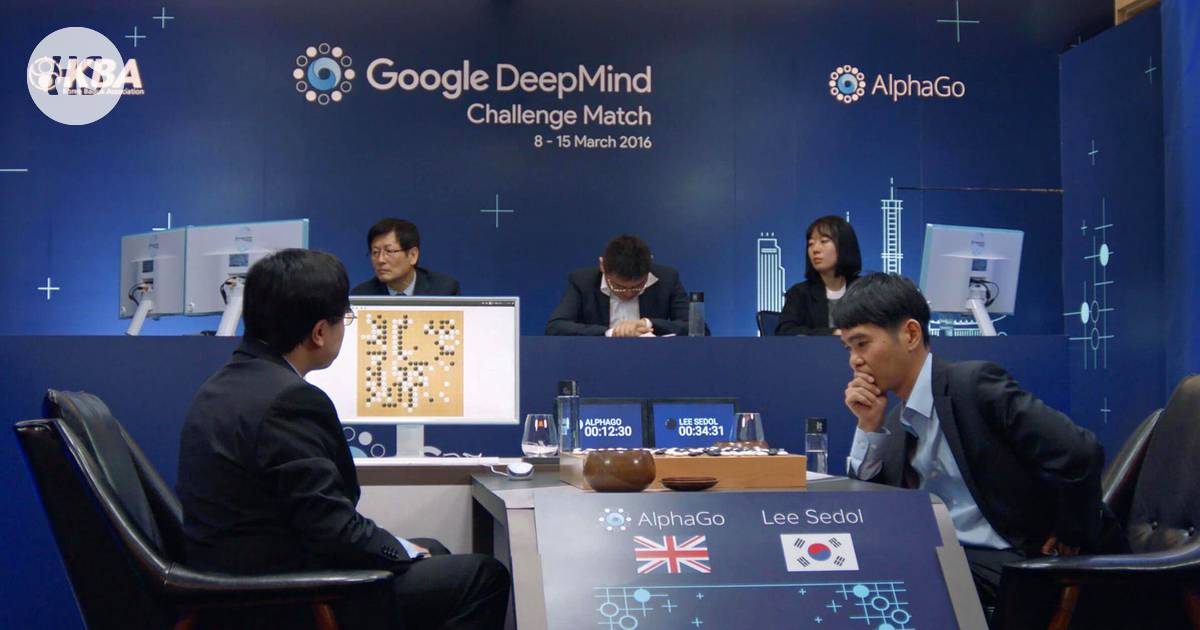

Revisiting the match that transformed the world of Go. Was it truly a loss for humanity, or is there something to be learned from the confrontation?
I had a few encounters with Go in my childhood and teenage years, but I didn’t truly embrace the game until adulthood. It was in late 2022 that the ancient game finally captivated me. I had discovered a beautiful new world ready to be explored, and I began immersing myself in it as much as possible. Playing games online, solving tsumego, watching “Hikaru no Go”, reading books… And then one day, while searching for more Go-related content, I stumbled upon a documentary on YouTube called “AlphaGo”. Going into the movie, I had no idea what it was about. A few times I had come across the phrase ‘AI-suggested move,’ but I never gave it much thought. That changed once I watched “AlphaGo”.
The movie chronicles the historic battle between Lee Sedol, one of the best Go players in the world, and AlphaGo, an extremely powerful AI created by Google’s DeepMind team. The five-game match ended in a 4-1 victory for AlphaGo, marking a new era where AI could defeat even the best human players.
I was amazed by the movie, but I was left with a bitter feeling that the world I had found had suddenly become much smaller. I started to doubt whether having Go in my life had any meaning beyond its 19×19 grid.
The Unforgettable Showdown
In 2016, the Go community was shocked to learn about the match organized between one of the greatest Go players of the era and a computer program. The match gained much attention from the public and was broadcast with commentary in Japanese, Chinese, Korean, and English.
Before delving into the match itself, let me quickly introduce you to the fighters:
In the red corner we have Lee Sedol.
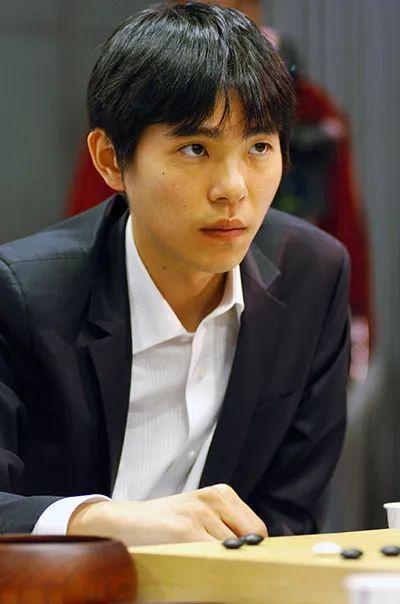
Nicknamed “The Strong Stone”. A Korean 9 dan professional Go player, Lee turned pro at the age of 12 and has won 18 international titles. Lee is recognized for his explosive and creative playing style, but also for being emotional and pessimistic when his plans don’t go as expected. In one game Lee resigned relatively early on, while even his opponent thought that Lee was leading. Some have said that Lee Sedol might rely too much on his talent, lacking the same level of effort in studying as other top-class players. Nevertheless, he has shown time and time again his genius level intuition that shines through his risky and aggressive moves. Lee is famous for “shaking” his opponents and turning the tides of battle in his favor. All of this cemented Lee Sedol as not just a great player, but a very “human” player as well. At times rash and impatient, but creative beyond limits, his every game exudes his human spirit.
Before his match with AlphaGo, one of his most famous games was “The broken ladder game” in 2003, where he won against Hong Chang-sik using a broken ladder, something that is usually considered a mistake common for beginners, but something that Lee planned in a masterful way in order to destroy his opponents large group that had presented a problem for him.
In the blue corner we have AlphaGo, a revolutionary Go program created by Google’s DeepMind team of computer scientists.
Before its creation, it was unimaginable for AI software to reach anywhere near the level of Go professionals.
When Deep Blue defeated the chess champion, Garry Kasparov in 1997, it did so through “brute force computation”, considering millions of possible moves and deciding which brought the highest chance of winning. That would simply not be possible for Go because of the sheer number of possible variations. Therefore, the main challenge for DeepMind was to have their program mimic human intuition. But that had never been done before.
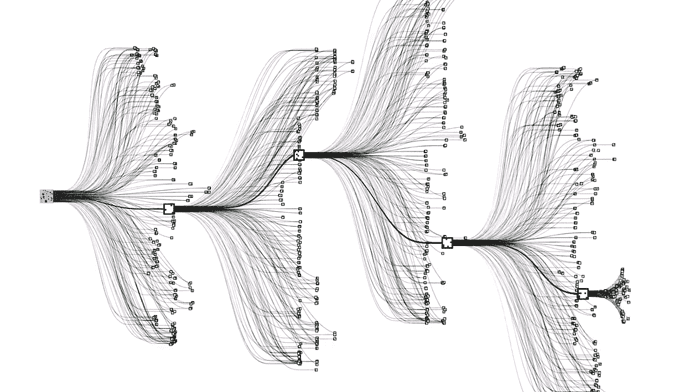
“People often say there are more positions in the game of Go than there are atoms in the known universe, But the truth is that if for every atom in the known universe, you had another universe and you counted all the atoms in that collection of universes, that comes closer to the number of positions in the game of Go.”- Thore Graepel, computer scientist who helped create AlphaGo
DeepMind achieved its goal by combining deep neural networks and advanced search algorithms. AlphaGo was trained by first showing it over 100,000 games played by strong amateur players, and then letting it play against other versions of itself millions of times in order to get stronger through the process of reinforcement learning.
AlphaGo’s training bore fruit in October 2015, when it defeated European Go champion Fan Hui(2P) 5-0, marking the first time an AI was able to defeat a professional player in a proper match.
Game 1: The Shock
“I’d like it if the machine didn’t beat a human in Go yet.”- Lee Hye-rim, moments before her father’s historic first game.
The first game was held on March 9th of 2016. Lee Sedol took black, while AlphaGo took white, with a Komi of 7.5
The game started normally, with a little testing from Lee to determine AlphaGo’s strength. But AlphaGo was able to answer very efficiently. A few moves later, White started a complicated fight and achieved good shape, already putting Black in a difficult position.
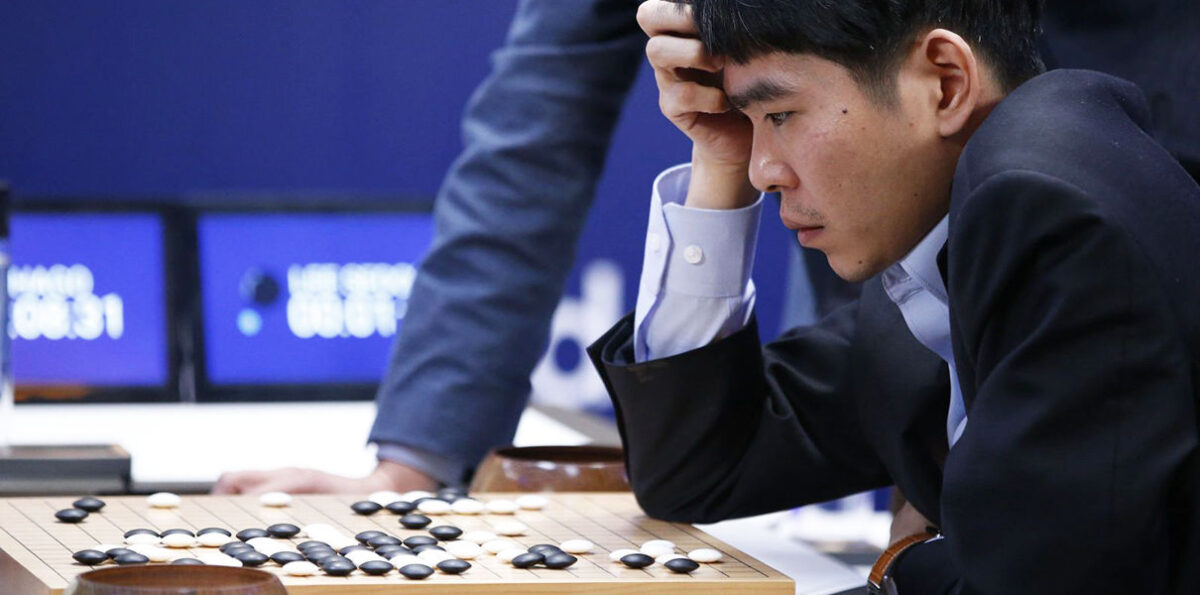
White continued to play calmly, and enjoyed a slight advantage. Once it had an advantage, AlphaGo began playing “safe” moves, something that confused audience members. The program was designed to play in a way that increased its chance of winning, even if in the process it lost points; in that way it secured its winning position.
Black resigned after move 186.
It was unbelievable, something nobody thought would happen at least for another decade. It was the start of a new era, both for Go and Artificial intelligence.
Game 2: The Machine
The next day marked another confrontation between man and machine, this time with no room for overconfidence. Lee had seen what AlphaGo was capable of and knew he was now the underdog.
This game is most famous for move 37, played by AlphaGo while Lee was on a smoke break. It was a shoulder hit on the fifth line. The move was first considered to be a mistake by the commentators and audience because it broke conventional wisdom, but when Lee returned to the table and saw the stone placed during his absence he was astounded. It took Lee more than 12 minutes to come up with a response, which itself was highly praised, but soon later AlphaGo already had a clear advantage in the game.
It was another victory for AlphaGo.
“This move made me think about Go in a new light. What does creativity mean in Go?”
– Lee Sedol, after the game
Game 3: The Defeat
After already losing the first two games, this was Lee’s last chance of turning things around and winning the match. Regrettably, AlphaGo again proceeded to dominate with its calm and calculated moves. Already by move 76 it started playing its “safe” moves that sacrifice points, a sure sign it’s leading, something like a declaration of victory at this point. It is considered practically impossible for a human player to turn the game around once AlphaGo takes the lead.
Near the end Lee tried to force the Ai to make a mistake by creating a complicated ko fight, but saw no success in that. And so it happened that Lee Sedol lost the third game as well, crushing the last hope of winning the match he thought wouldn’t even be a challenge for him just a few days earlier.

Game 4: The Human
This time, Lee Sedol employed a particularly difficult strategy called “amashi”, aiming to outlast the opponent by letting him take larger points of influence in exchange for profit.
The game started with the exact same first 11 moves that were played in game 2. AlphaGo gained a lead early in the game with its unique moves and ability to read the whole board. But everything changed when Lee played move 78.
Just as move 37 from game 2 is famous for how it showed that a machine can break its limits, so too is move 78 from this game famous for showing that humans can break their limits as well. Lee’s move was a wedge in the center of the board that drastically increased the game’s complexity. In this way it triggered an error that is inherent to the Monte Carlo tree search algorithm used in AlphaGo’s neural network. The algorithm finds some sequences to be irrelevant, and therefore doesn’t consider them during play. Basically, Lee’s move was so unlikely that AlphaGo didn’t even consider it an option during the game and therefore had no strategy ready for it.
The move itself was later dubbed the “God’s touch”. After that move, AlphaGo played a string of unusual moves that led to its resignation after move 180.
Move 78, as per AlphaGo’s calculations, had only a 1 in 10,000 chance of a human player finding it.
To date, this is the only recorded game where AlphaGo lost against a human.
Game 5: The End And The Beginning
For the fifth game, Lee Sedol requested to play as Black. He had won the fourth game as White, but stated that a victory as Black would be much more valuable, since he believes that AlphaGo plays its best as White.
Even though the match was already lost, there was still meaning in playing the fifth game. Not just for Lee Sedol, but for the whole Go community, there was a huge difference in whether the loss was 1-4 or 2-3. The message would be vastly different and AI wouldn’t be regarded as such an unstoppable force with the later result. There was still a lot to prove for both sides, with no room for carelessness.
Even though Lee Sedol played solidly for most of the game, even gaining a lead in the beginning, he wasn’t able to secure another victory, and it’s widely agreed that he had already lost by move 105.
Lee resigned after move 280, and with that the historic match had come to an end with a clear victory for AlphaGo.
But the end of this match also marked the beginning of modern AI, preparing the world for machines with general purpose intelligence.
“The end of an era… board games are more or less done and it’s time to move on.” – Murray Campbell, one of the creators of DeepBlue, the chess playing AI that defeated Gary Kasparov.
The Aftermath
After winning the match, AlphaGo was awarded the rank of honorary 9 dan by the Korean Baduk Association for its creativity and help in advancing the future of the game.
The battle was won, and the point proven, AlphaGo was able to master the game of Go. But, the mission wasn’t over yet. As game 4 had proven, there was still a lot of room for improvement. And who knows, maybe this was an isolated incident. Maybe AlphaGo was simply built to specifically counter Lee Sedol. The fact it was able to beat him doesn’t necessarily mean it would be able to beat other world-class players… Right?
In December of that same year, an updated version of AlphaGo played on the Tygem and FoxGo servers under the name of “Magister,” and later “Master.” It played 60 games against professional players and won all 60 of them. Among those victories were also three games against Ke Jie, the top-ranked Go player at the time.
“After humanity spent thousands of years improving our tactics, computers tell us that humans are completely wrong… I would go as far as to say not a single human has touched the edge of the truth of Go.”– Ke Jie
After that, one more challenge awaited: the Future of Go Summit, held in May of 2017, in Wuzhen, China. Here AlphaGo played the best Chinese Go players. First, it defeated Ke Jie again in a three-game match. Later, it also won a 5 against 1 game against a team of 5 top Chinese Go players who played together as black and were able to consult each other on the moves that would be played. Even that wasn’t a challenge for AI anymore.
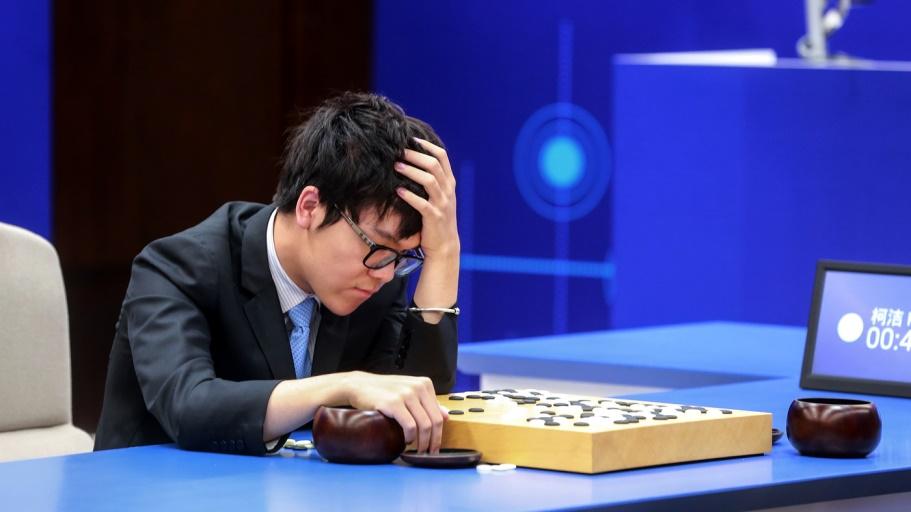
In October of 2017, DeepMind introduced the world to AlphaGo Zero, an even further upgraded version of AlphaGo. It was able to defeat the version that played against Lee Sedol within the first 3 days, and it was on the level of AlphaGo Master within 21 days. By day 40, AlphaGo Zero exceeded all other versions created.
The Legacy
The fight between Lee Sedol and AlphaGo left lasting and profound marks on both the worlds of Go and computer science.
AlphaGo showed the efficiency of deep neural networks and reinforcement learning. The methods it created are now used in the development of healthcare, finance, robotics, and autonomous vehicles. It also sparked conversations about what AI could do in the future and how the nature of human-machine relations could change over the years. But, whatever the future may bring, it is important to remember that AlphaGo isn’t some kind of android that appeared with the intention to conquer humanity. It is no more than a program created by a team of dedicated and passionate scientists who wanted to break the limits of what was thought to be possible. AlphaGo is as much a testament to the human will and pursuit of knowledge as the game of Go is itself.
As for the world of Go, after watching the movie I felt overwhelmed and thought it had become smaller. But that was a mistake. It took me some time to realize how much Go had actually changed and benefited from AI. The moves it played and strategies it used have been widely studied and changed the way we thought about approaching the game. By analyzing AlphaGo’s games, many players have incorporated its experimental and creative style into their own, leading to a significant increase in the overall level of play in the Go community. The presence of AI technology also came in as a useful training resource, allowing players to easily and freely analyze their games, find mistakes, and explore better move options.
The presence of an unbeatable force may seem scary and demoralizing, but it certainly doesn’t mark the end of Go. Go, like life itself, is ever-growing and changing. There will always be new obstacles to overcome and new tools to help along the way. The only thing that stays the same is the board, with its 19 by 19 grid, waiting to reveal the conflicting truths of those who play on it.
What do you think of the way the presence of AI has changed Go? Do you use it for training, or do you like to practice the old fashioned way? Please share your thoughts with us in the comments.
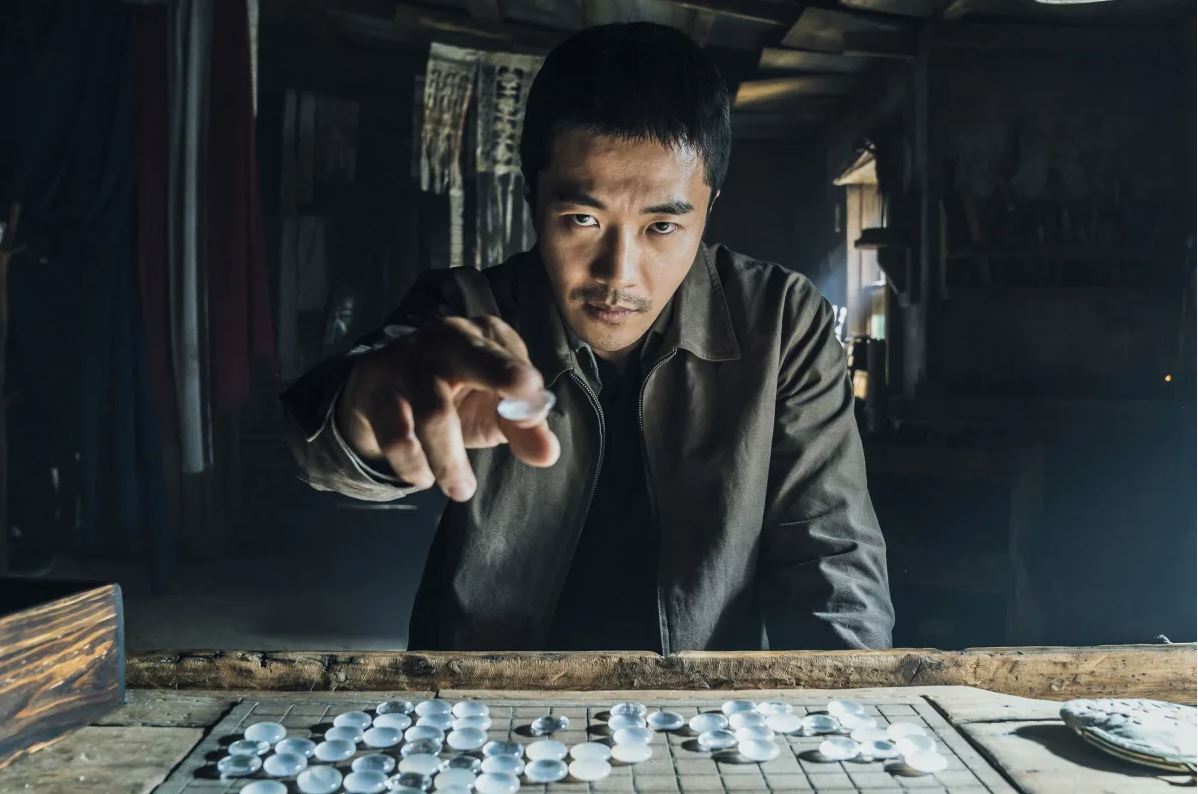
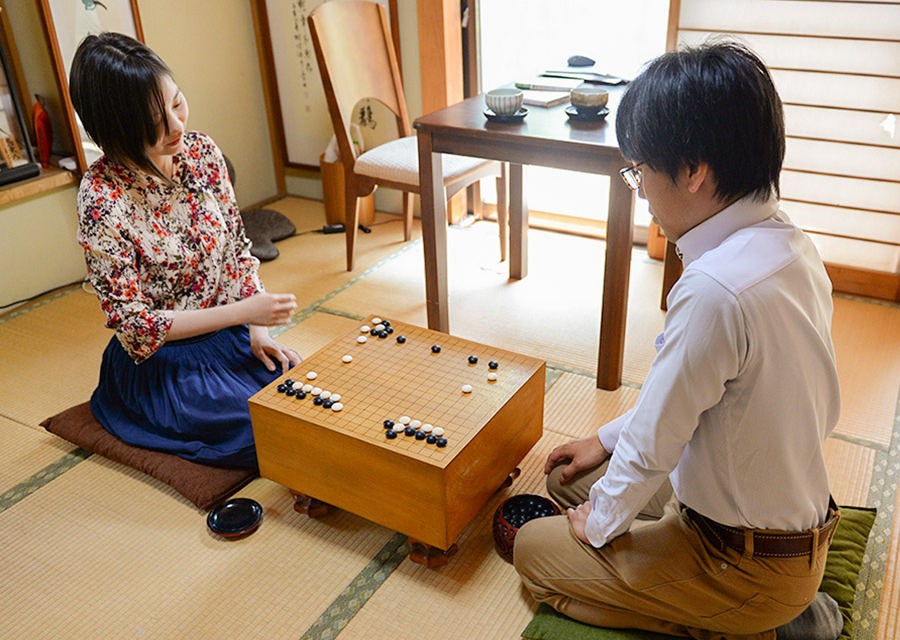
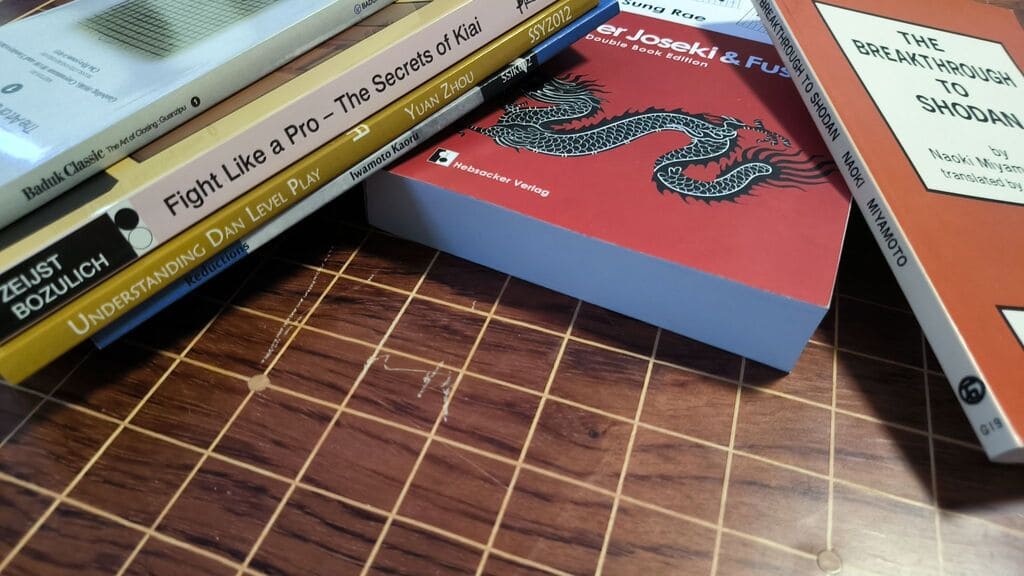
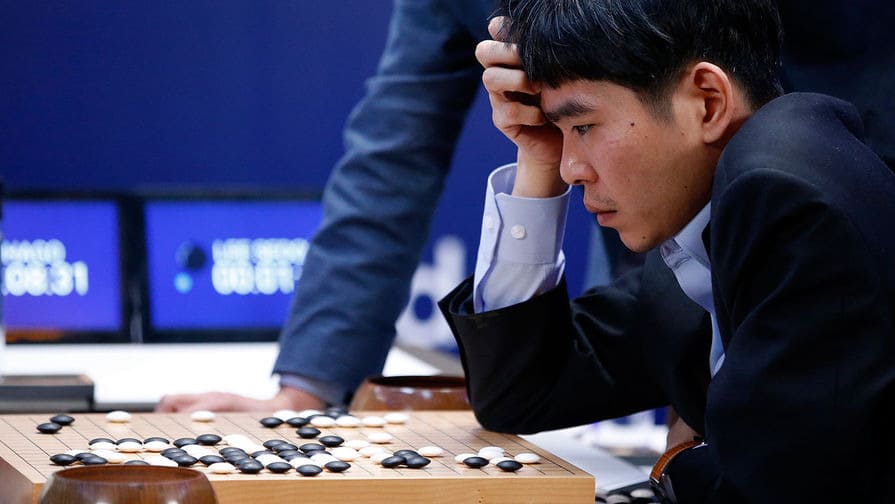
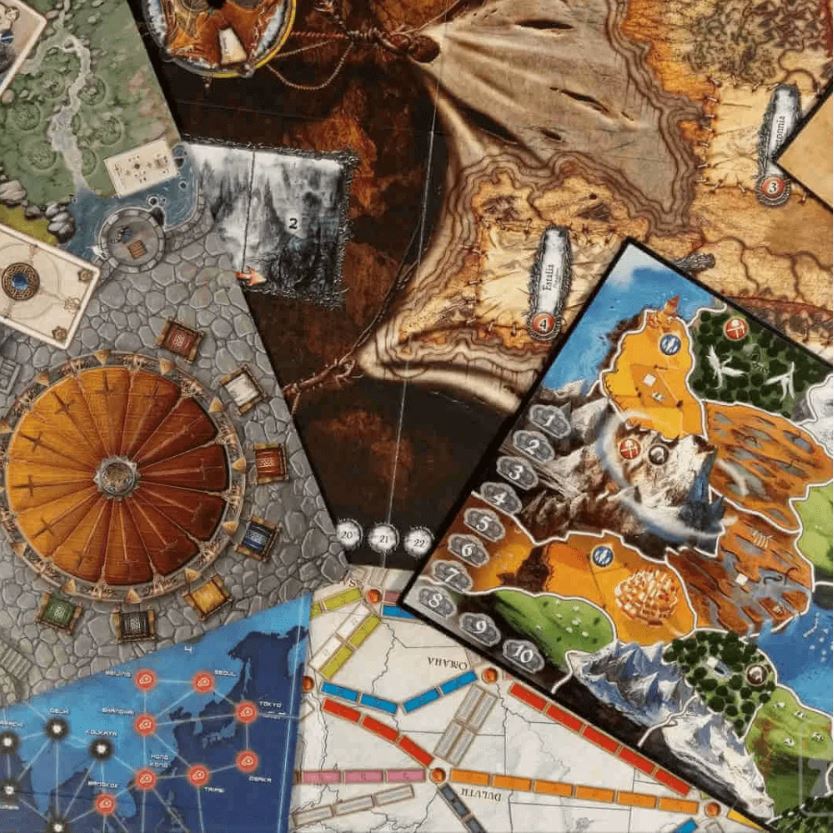
Spelling and grammar Nazi here:
1. The second paragraph under “Game 2: The Machine” is indented with a space at the beginning (I assume by mistake).
2. The second paragraph under “Game 5: The End And The Beginning” has “later result” written instead of “latter result.”